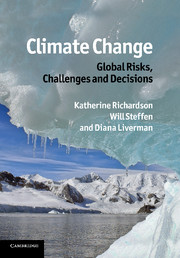Preface
Published online by Cambridge University Press: 04 April 2011
Summary
Human activities impact many of the Earth's natural functions and cycles. Local and regional impacts of human activity on the planet are easily seen, while global impacts are not so immediately obvious. Nevertheless, studies in Earth System science carried out in recent decades have unequivocally demonstrated impacts of human activity that reverberate at the global level.
This recognition has led to the suggestion that we may have moved out of the geological period referred to as the Holocene – an epoch that covers the past approximately 12,000 years and in which human societies have flourished – and have now entered a new era, where human impacts are changing Earth System functioning. The knowledge that human activities can and do influence planetary functioning implies an obligation to actively monitor and manage the relationship between humans and the planet.
This paradigm shift in the relationship between humans and the planet actually started with the Montreal Protocol (ratified in 1989), which limits the global emission of chlorofluorocarbon (CFC) gases that lead to a reduction in the ozone layer that surrounds the Earth and shields it from dangerous ultraviolet radiation. Dealing with human-induced climate change can be viewed as the next step in this redefinition of the human–Earth relationship.
Managing the human activities that lead to climate change is more difficult than regulating the emission of CFC gases, as it will require radical changes in the very fabric of most societies: a change in attitude with respect to energy use as well as changes in global society's primary energy source, use of natural resources, methods of food production and modes of transport.
- Type
- Chapter
- Information
- Climate Change: Global Risks, Challenges and Decisions , pp. xvii - xviiiPublisher: Cambridge University PressPrint publication year: 2011



